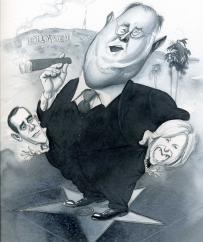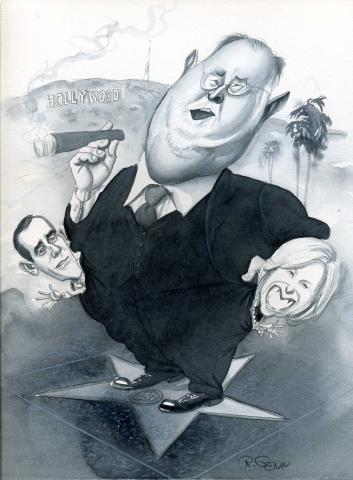This is another in a series of TPR exclusive interviews with TJ Plunkitt, who is in Los Angeles on a travel and study grant from the family’s Institute of Government Studies to substantiate the thesis of his infamous forefather, George Washington Plunkitt, NYC's Tammany Hall leader at the turn of the 20th Century. The elder (GW) Plunkitt sermonized that political favoritism and a bloated bureaucracy are not antithetical to the health of cities, and that most citizens don’t care anyway. But TPR does, and trusts that these interviews will lend perspective to the long-suffering politics and potential of Los Angeles.

R Genn
"City Hall insiders will always make it their business to know who butters their bread, preferably on both sides. Certainly DWP's Brian D'Arcy and the LA Coalition of Public Employee Unions' Maria Elena Durazo know. They may have put their money on a losing Wendy, but they still very much won the City's elections.” -TJ Plunkitt
Last month The Planning Report found TJ in City Hall listening to casual conversations to see if anyone was concerned about the mayoral race or perhaps the city's fiscal woes.
They weren't! Their indifference—some would say their cynicism—perhaps reflected in the poor turnout in the election last month. Those he spoke to in City Hall earning their living legitimately felt that Democracy-be-damned as long as their sinecures were safe, that the kumbya approaches to policy making of the "safe" Wendy or the preppy idealist Eric did not threaten their security. Tenure in public office confirmed for them that both were nurtured on the constant flow of municipal milk, and neither was tough enough to fully embrace the private sector lambast against fiscally irresponsible public payrolls and underfunded pensions. And certainly the private sector is not without sloth.
This month we joined TJ strolling along Hollywood Boulevard in the heart of the 42 year old Mayor-elect Eric Garcetti 's council district, which he had served for 12 years, including four as the council's president.
TRP: Why are you, pad-in-hand, on Hollywood Boulevard?
TJ: I'm trying to get a sense of what the young Eric did to distinguish himself as the local liberal councilman and successful candidate for mayor, and perhaps offer some hint of how he might now serve the city at large. There has been some speculation by the local media, but typically it has focused on his Jewish-Italian-Mexican roots and other superficialities. Frankly, the election post-mortems have so far failed to enlighten the way the NY press does. It is a problem wanna-be journalists have sitting all day at their computers and not actually experiencing sidewalk politics or the diversity of the city.
TPR: And what have you found?
TJ: Frankly the core of Hollywood remains to the eastern-eye tacky and touristy. To be sure, there is now well used subway portals and a half dozen sky-high cranes, all of which evidence so-called transit oriented development: but the latter, to be honest, still remains more of a planning promise than a real estate reality.
TPR: Maybe so, but there is a discernible rise finally in the city's economy, increased real estate activity, a below-the-radar screen, landuse lawyer's dream, merger of the City’s permitting and planning departments, and the expectation of millennial growth shaped by high rises and mixed-use housing that the mayor elect can now trumpet?
TJ: Yes, but my conversations suggest there are no longer CRA grants to sweeten the deals and city tax breaks to use as leverage to subsidize rents. The only thing left the city can bargain with is zoning bonuses that the neighborhood residents are sure to protest. This absence of grease could be a problem for Garcetti and his community committed rhetoric.
Indeed, it might wear thin sooner than later. I did hear local murmurings in the recent election about his ambivalent planning history. Not incidentally, like so many other potentially pointed talking points, this is one Wendy failed to follow up and flay.
TPR: From your perspective as a born and ill-bred New Yorker, forged by the fires of a rough and tumble body politic, how do you explain Eric’s eight point victory?
TJ: Easy question. Those I spoke to while wandering the halls of City Hall last month or DWP earlier, knew their jobs were safe, that the abuses being proclaimed by Wendy and Eric in the heat of the campaign was simply grandstanding before the reformers, and there was no compelling candidate for them to rally around. That is also why, I have concluded, so many people didn’t bother to vote, intuitively knowing that whomever was elected wouldn’t make much of a difference to anyone except the candidates themselves and their needy friends. If the election validated anything, it was the inherent real politic cynicism GW expressed more than a century ago.
TPR: Is that why Antonio Villaraigosa kept smiling during the campaign when both “focused group” driven reformers and entertainment-oriented media were lamenting the state of city and, in effect, bad mouthing the mayor for being all talk and little action.
TJ: Yes. He obviously knew either the young Eric striding earnestly or the ever-affable Wendy tiptoeing through the debates were an unthreatening successor. I expect, as GW would have predicted, that their having come of age in City Hall led both to appreciate the limitations of the office of the mayor, even if those few voting or the gullible media can’t.
 TPR: Be more specific. What do you think your notorious forefather GW would have appreciated about the LA City election results?
TPR: Be more specific. What do you think your notorious forefather GW would have appreciated about the LA City election results?
TJ: The fact that public employee sinecures came under constant, harmless fire from reformers no doubt would have brought a smile to his face, especially so since both Greuel and Garcetti were such strong champions in the past as well as beneficiaries of city hall union support.
GW fully embraced an eternal truth: that Tammany Hall's power rested on the loyalty of employees he placed in city and related jobs; not from defending against sanctimonious allegations of waste, fraud and abuse. What he knew still drives election victories today: “I can always get a job for a deservin’ man. I make it a point to keep on the track of jobs, and it seldom happens that I don’t have a few up my sleeve ready for use. I know every big employer in the district and in the whole city, for that matter, and they ain’t in the habit of sayin’ no to me when I ask them for a job.”
TPR: So what can we expect from LA’s new Mayor and City Council? The ‘same old, same old’?
TJ: Absolutely: Mayor V's last budget, adopted unanimously by the city council after the election results were tabulated, included another 5 percent raise for the very union employees who allegedly got the city into its fiscal mess. And, while many reformers and local media were focused on the embarrassing election turnout, or critiques of the candidate campaigns, and, TOO often, the apple pie promises of a brighter tomorrow; the City Council, without meaningful neighborhood input or media coverage, unanimously merged Building and Safety and City Planning to make it easier for developers and their lawyers to densify.
Of course GW knew, City Hall insiders will always make it their business to know who butters their bread, preferably on both sides. Certainly DWP's Brian D'Arcy and the LA Coalition of Public Employee Unions' Maria Elena Durazo know. They may have put their money on a losing Wendy, but they still very much won the City's elections.
TPR: And what do you think GW would say?
TJ: “The more things change, the more they stay the same.”
- Log in to post comments



